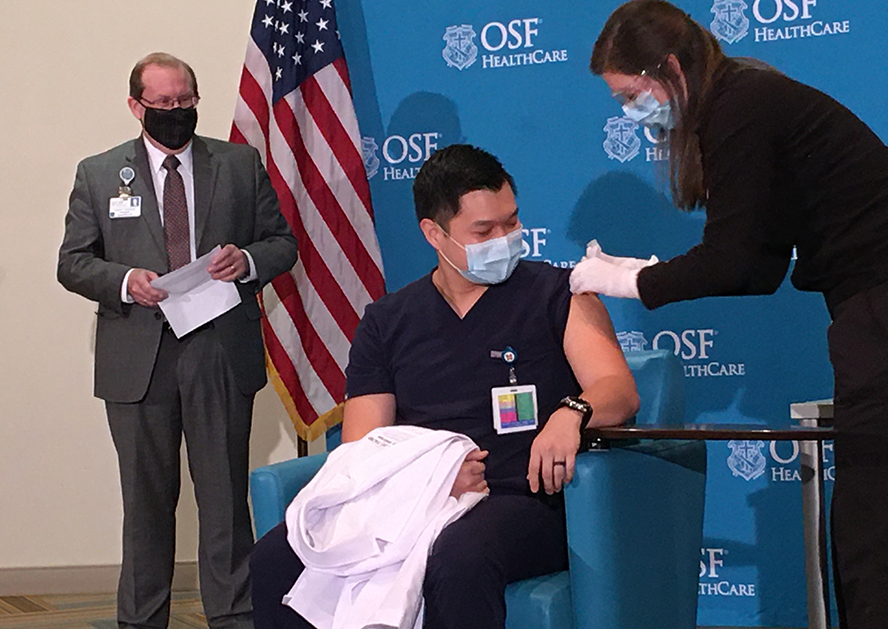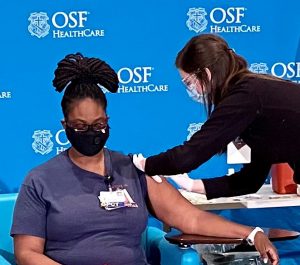Consider receiving the COVID-19 vaccine ‘as an act of charity,’ say U.S. bishops

Dr. Victor Chan, chief of emergency services at OSF HealthCare Saint Francis Medical Center in Peoria, receives the Pfizer/BioNTech COVID-19 vaccine on Dec. 15. Looking on is Robert Anderson, president of the medical center. (Provided photo/OSF Newsroom
WASHINGTON (CNS) — The “gravity” of the ongoing COVID-19 pandemic and “the lack of availability of alternative vaccines,” are “sufficiently serious” reasons to accept the Pfizer/BioNTech and Moderna vaccines, the chairmen of the U.S. bishops’ doctrine and pro-life committees said Dec. 14.
“Receiving the COVID-19 vaccine ought to be understood as an act of charity toward the other members of our community,” they said. “In this way, being vaccinated safely against COVID-19 should be considered an act of love of our neighbor and part of our moral responsibility for the common good.” The full text of their statement is found here.
The bishops addressed the moral concerns raised by the fact the Pfizer and Moderna vaccines have some connection to cell lines that originated with tissue taken from abortions.
However, this connection to morally compromised cell lines is so remote and the public health situation is too grave to reject the vaccines, said Bishop Kevin C. Rhoades of Fort Wayne-South Bend, Indiana, chairman of the U.S. Conference of Catholic Bishops’ Committee on Doctrine, and Archbishop Joseph F. Naumann of Kansas City, Kansas, chairman of the USCCB’s Committee on Pro-Life Activities.
FIRST VACCINATIONS BEGIN
History was made on the campus of OSF HealthCare Saint Francis Medical Center in Peoria on Tuesday as five employees were among the first in Illinois to receive the Pfizer/BioNTech COVID-19 vaccine.
“I like to see the excitement, the engagement of the staff, and I appreciate the patience of those who aren’t getting it yet because they don’t have the risk factors and the exposures of other people,” said Robert Anderson, president of OSF Saint Francis, who was among the witnesses at the Dec. 15 press event and initial vaccinations.
Others present included Illinois Gov. J.B. Pritzker and Dr. Ngozi Ezike, director of the Illinois Department of Public Health.
The OSF Saint Francis employees receiving the vaccine Tuesday represented the wide range of front line caregivers who make up the first wave of eligible recipients. They included Chemica Jones, CNA; Juan Fernandez, transporter; Doug Meyer, respiratory therapist; Evelyn Tatum, environmental services, and Dr. Victor Chan, chief of emergency services.
“I just wanted to do my part in my community and just be safe, keep my family safe and my friends safe,” said Jones after receiving the vaccine. “I know it might take a while, but getting the vaccine is the first step in getting this under control.”
“It’s encouraging for our entire community, because we can’t take care of all the health care needs that come to OSF unless we have healthy mission partners,” said Anderson. The first vaccinations are going to medical personnel who work with COVID-19 patients. Vaccinations of employees throughout the OSF HealthCare system is expected to take several months.
ASTRAZENECA VACCINE “MORE MORALLY COMPROMISED,” BUT . . .
Late Dec. 11, the U.S. Food and Drug Administration gave emergency-use approval to the Pfizer vaccine, with approval expected for Moderna the week of Dec. 14. UPS and FedEx began shipping the doses across the country Dec. 12, with the first shipments arriving Dec. 14.

Chemica Jones, CNA, was among five OSF HealthCare Saint Francis Medical Center employees vaccinated during a press event in Peoria on Dec. 15. (Provided photo/OSF Newsroom)
Each state has a distribution plan for administering them. National guidelines call for health care workers and those in nursing homes and long-term care facilities to be first in line to get immunized.
On Dec. 8, The Lancet medical journal reported that four clinical trials of a third vaccine, being developed by the University of Oxford and AstraZeneca “appears to have moderate efficacy in preventing symptomatic illness, and may significantly reduce hospitalization from the disease.” Astra Zeneca is expected to apply to the FDA for emergency use of its vaccine in the coming weeks.
Bishop Rhoades and Archbishop Naumann said they found the AstraZeneca vaccine it to be “more morally compromised” and concluded this vaccine “should be avoided” if there are alternatives available.
“It may turn out, however, that one does not really have a choice of vaccine, at least, not without a lengthy delay in immunization that may have serious consequences for one’s health and the health of others,” the two prelates stated. “In such a case . . . it would be permissible to accept the AstraZeneca vaccine.”
VATICAN OFFERED GUIDANCE
Shortly after Pfizer and Moderna announced Nov. 11 and Nov. 16, respectively, that their vaccines were 95 percent effective against COVID-19, critics claimed the vaccines have been produced using cells from aborted fetuses, leading to confusion over “the moral permissibility” of using these vaccines.
Bishop Rhoades and Archbishop Naumann addressed this issue in a Nov. 23 memo to their fellow bishops and addressed it again in their 2,400-word statement Dec. 12. In the memo they noted some were “asserting that if a vaccine is connected in any way with tainted cell lines, then it is immoral to be vaccinated with them. This is an inaccurate portrayal of Catholic moral teaching.”
In their new lengthy statement, the two committee chairmen emphasized that any such cell lines were derived from tissue samples taken from fetuses aborted in the 1960s and 1970s and have been grown in laboratories all over the world since then.
“It is important to note that the making of the rubella vaccine — or that of the new COVID-19 vaccines — does not involve cells taken directly from the body of an aborted child,” Bishop Rhoades and Archbishop Naumann said. “Cells taken from two abortions in the 1960s were replicated in a laboratory to produce two cell lines that can be reproduced again and again, indefinitely.”
The two committee chairmen said the Vatican, through the Congregation for the Doctrine of the Faith and the Pontifical Academy for Life, “has offered guidance on the question of whether it is morally acceptable to receive a vaccine that has been created with the use of morally compromised cell lines.”
Both the congregation and the academy “emphasize the positive moral obligation to do good,” they said, “and in so doing to distance oneself as much as possible from the immoral act of another party such as abortion in order to avoid cooperation with someone else’s evil actions and to avoid giving scandal, which could happen if one’s own actions were perceived by other people to ignore or to minimize the evil of the action.”
“Our love of neighbor should lead us to avoid giving scandal, but we cannot omit fulfilling serious obligations such as the prevention of deadly infection and the spread of contagion among those who are vulnerable just to avoid the appearance of scandal,” the two prelates said.
At the same time, the bishops also cautioned Catholics against complacency about the moral issue of abortion and ethical issues surrounding the development of some vaccines.
“While having ourselves and our families immunized against COVID-19 with the new vaccines is morally permissible and can be an act of self-love and of charity toward others, we must not allow the gravely immoral nature of abortion to be obscured,” Bishop Rhoades and Archbishop Naumann said.





